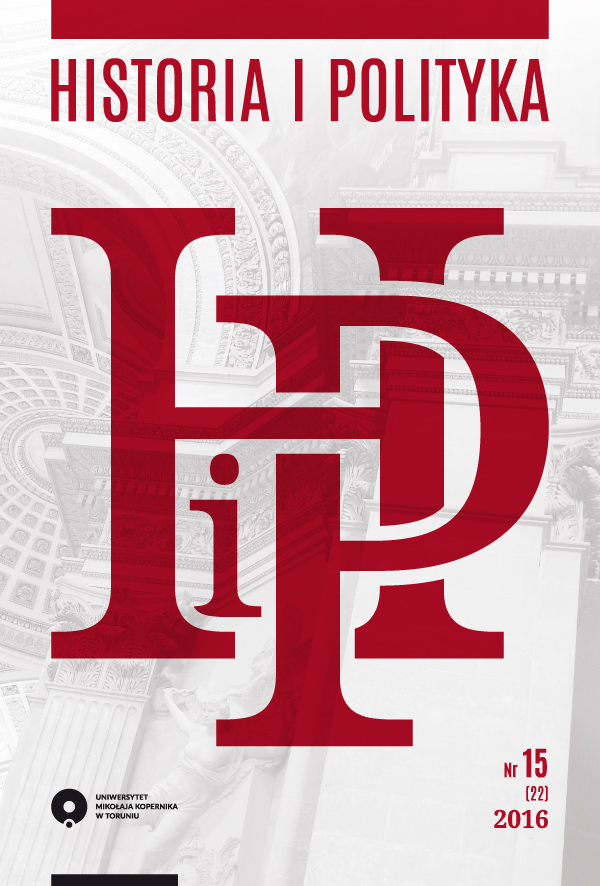Identyfikacje ideologiczne a preferencje wyborcze społeczeństwa polskiego
DOI:
https://doi.org/10.12775/HiP.2016.001Słowa kluczowe
identyfikacje ideologiczne, wybory, lewica, prawica, społeczeństwo polskieAbstrakt
The current left-right dichotomy permanently organizes the perception of politics by the Polish society. This thesis is confirmed both in academic discourse as well as in the results of public opinion polls. In that context, it becomes extremely important to determine the understanding of the left and the right in relation to the electoral preferences of the Poles. The thesis and the hypotheses were verified in a process of analyzing the variables obtained in the present study, carried out in 2008–2015 on a representative sample of the adults. The results partially confirm the thesis. Compatibility between the understanding the left-right dichotomy and the characteristics of the doctrines depends on the electoral preferences of the respondents, but not for followers of all analyzed batches. The most consistency and compatibility with the model of doctrinal understanding of these concepts can be found in the preferences of the Democratic Left Alliance electorate. In the Law and Justice electorate, the understanding of the analyzed concepts is incomplete and only partially consistent with the declared right wing preferences, whereas, the biggest ideological disorientation can be noted among supporters of the Civic Platform. Undoubtedly, the voters’ perception of the political scene through the lens of the division
between the left and the right is still effective
and valid.
Bibliografia
Bobbio, N. (1996). Prawica i lewica. Kraków: Znak.
Frankfurt-Nachmias, Ch., Nachmias, D. (2001). Metody badawcze w naukach społecznych. Poznań: Zysk i s-ka.
Fuchs, D., Klingemann, H. D. (1989). The Left-Right Schema. W: W. de Gruyter, Continuities in Political Action. A Longitudinal Study of Political Orientations in Three Western Democraties. Berlin: Walter De Gruyter Inc.
Godlewski, T. (2008). Lewica i Prawica w świadomości społeczeństwa polskiego. Warszawa: Elipsa.
Grabowska, M., Szawiel, T. (2001). Budowanie demokracji. Podziały społeczne, partie polityczne i społeczeństwo obywatelskie w postkomunistycznej Polsce. Warszawa: PWN.
Kitschelt, H. (1994). The Transformation of European Social Democracy. Cambridge: Cambridge University Press.
Lijphard, A. (1999). Patterns of Democracy. Government Forms and Performance in ThirtySix Countries. New Haven: Yale Universty Press.
Mayntz, R., Holm, K., Hubner, P. (1985). Wprowadzenie do metod socjologii empirycznej. Warszawa: PWN.
Wojtaszczyk, K. (1995). Partie i ugrupowania polityczne. W: R. Chruściak, T. Mołdawa, K. A. Wojtaszczyk, E. Zieliński (red.), Polski system polityczny w okresie transformacji. Warszawa: Elipsa.
Pobrania
Opublikowane
Jak cytować
Numer
Dział
Licencja
Uniwersytet Mikołaja Kopernika w Toruniu respektuje prawo do prywatności i ochrony danych osobowych autorów.
Dane autorów nie są wykorzystywane w celach handlowych i marketingowych. Redaktorzy i recenzenci są zobowiązani do zachowania w poufności wszelkich informacji związanych ze złożonymi do redakcji tekstami.
Autor, zgłaszając swój tekst wyraża zgodę na wszystkie warunki i zapisy umowy licencyjnej (określającej prawa autorskie) z Uniwersytetem Mikołaja Kopernika w Toruniu.
Statystyki
Liczba wyświetleń i pobrań: 606
Liczba cytowań: 0



